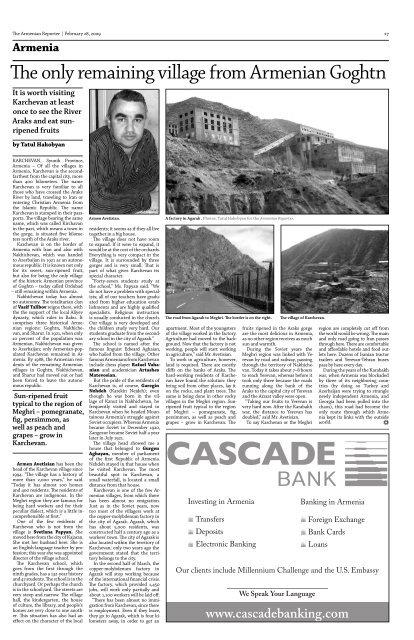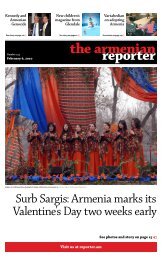National, International, Armenia, and Community News and Opinion
National, International, Armenia, and Community News and Opinion
National, International, Armenia, and Community News and Opinion
Create successful ePaper yourself
Turn your PDF publications into a flip-book with our unique Google optimized e-Paper software.
The <strong>Armenia</strong>n Reporter | February 28, 2009 17<br />
<strong>Armenia</strong><br />
The only remaining village from <strong>Armenia</strong>n Goghtn<br />
It is worth visiting<br />
Karchevan at least<br />
once to see the River<br />
Araks <strong>and</strong> eat sunripened<br />
fruits<br />
by Tatul Hakobyan<br />
KARCHEVAN, Syunik Province,<br />
<strong>Armenia</strong> – Of all the villages in<br />
<strong>Armenia</strong>, Karchevan is the secondfarthest<br />
from the capital city, more<br />
than 400 kilometers. The name<br />
Karchevan is very familiar to all<br />
those who have crossed the Araks<br />
River by l<strong>and</strong>, traveling to Iran or<br />
entering Christian <strong>Armenia</strong> from<br />
the Islamic Republic. The name<br />
Karchevan is stamped in their passports.<br />
The village bearing the same<br />
name, which was called Kirchavan<br />
in the past, which means a town in<br />
the gorge, is situated five kilometers<br />
north of the Araks river.<br />
Karchevan is on the border of<br />
<strong>Armenia</strong> with Iran <strong>and</strong> also with<br />
Nakhichevan, which was h<strong>and</strong>ed<br />
to Azerbaijan in 1921 as an autonomous<br />
republic. It is known not only<br />
for its sweet, sun-ripened fruit,<br />
but also for being the only village<br />
of the historic <strong>Armenia</strong>n province<br />
of Goghtn – today called Ordubad<br />
– still remaining within <strong>Armenia</strong>.<br />
Nakhichevan today has almost<br />
no autonomy. The totalitarian clan<br />
of Vasif Talibov reigns there, with<br />
the the support of the local Aliyev<br />
dynasty, which rules in Baku. It<br />
comprises three historical <strong>Armenia</strong>n<br />
regions: Goghtn, Nakhichevan,<br />
<strong>and</strong> Sharur. In 1921, when only<br />
10 percent of the population was<br />
<strong>Armenia</strong>n, Nakhichevan was given<br />
to Azerbaijan; only <strong>Armenia</strong>n-populated<br />
Karchevan remained in <strong>Armenia</strong>.<br />
By 1988, the <strong>Armenia</strong>n residents<br />
of the remaining <strong>Armenia</strong>n<br />
villages in Goghtn, Nakhichevan,<br />
<strong>and</strong> Sharur had moved out or had<br />
been forced to leave the autonomous<br />
republic.<br />
Sun-ripened fruit<br />
typical to the region of<br />
Meghri – pomegranate,<br />
fig, persimmon, as<br />
well as peach <strong>and</strong><br />
grapes – grow in<br />
Karchevan.<br />
Armen Avetisian has been the<br />
head of the Karchevan village since<br />
1994. “The village has a history of<br />
more than 2,000 years,” he said.<br />
“Today it has almost 100 homes<br />
<strong>and</strong> 400 residents. The residents of<br />
Karchevan are indigenous. In the<br />
Meghri region they are famous for<br />
being hard workers <strong>and</strong> for their<br />
peculiar dialect, which is a little incomprehensible<br />
at first.”<br />
One of the few residents of<br />
Karchevan who is not from the<br />
village is Svetlana Papyan. She<br />
moved here from the city of Kajaran.<br />
She met her husb<strong>and</strong> here. She is<br />
an English-language teacher by profession;<br />
this year she was appointed<br />
director of the village school.<br />
The Karchevan school, which<br />
goes from the first through the<br />
ninth grades, has a 132-year history<br />
<strong>and</strong> 47 students. The school is in the<br />
churchyard. Or perhaps the church<br />
is in the schoolyard. The streets are<br />
very steep <strong>and</strong> narrow. The village<br />
hall, the kindergarten, the house<br />
of culture, the library, <strong>and</strong> people’s<br />
homes are very close to one another.<br />
This situation has also had an<br />
effect on the character of the local<br />
Armen Avetisian.<br />
residents; it seems as if they all live<br />
together in a big house.<br />
The village does not have room<br />
to exp<strong>and</strong>. If it were to exp<strong>and</strong>, it<br />
would be at the cost of the orchards.<br />
Everything is very compact in the<br />
village. It is surrounded by three<br />
gorges <strong>and</strong> is very small. That is<br />
part of what gives Karchevan its<br />
special character.<br />
“Forty-seven students study at<br />
the school,” Ms. Papyan said. “We<br />
do not have a problem with specialists;<br />
all of our teachers have graduated<br />
from higher education establishments<br />
<strong>and</strong> are highly qualified<br />
specialists. Religious instruction<br />
is usually conducted in the church.<br />
Our village is very developed <strong>and</strong><br />
the children study very hard. Our<br />
students graduate from the secondary<br />
school in the city of Agarak.”<br />
The school is named after the<br />
famous linguist Edward Aghaian,<br />
who hailed from the village. Other<br />
famous <strong>Armenia</strong>ns from Karchevan<br />
include chess player Rafael Vahanian<br />
<strong>and</strong> academician Artashes<br />
Matevosian.<br />
But the pride of the residents of<br />
Karchevan is, of course, Garegin<br />
Nzhdeh (Karekin Nejdeh); even<br />
though he was born in the village<br />
of Kznut in Nakhichevan, he<br />
frequently visited <strong>and</strong> stayed in<br />
Karchevan when he headed Mountainous<br />
<strong>Armenia</strong>’s struggle against<br />
Soviet occupiers. Whereas <strong>Armenia</strong><br />
became Soviet in December 1920,<br />
Zangezur became Soviet half a year<br />
later in July 1921.<br />
The village head showed me a<br />
house that belonged to Gurgen<br />
Aghayan, member of parliament<br />
of the first Republic of <strong>Armenia</strong>.<br />
Nzhdeh stayed in that house when<br />
he visited Karchevan. The most<br />
beautiful spot in Karchevan, a<br />
small waterfall, is located a small<br />
distance from that house.<br />
Karchevan is one of the few <strong>Armenia</strong>n<br />
villages, from which there<br />
has been almost no emigration.<br />
Just as in the Soviet years, now<br />
too most of the villagers work at<br />
the copper-molybdenum factory in<br />
the city of Agarak. Agarak, which<br />
has about 5,000 residents, was<br />
constructed half a century ago as a<br />
workers’ town. The city of Agarak is<br />
also located within the territory of<br />
Karchevan; only two years ago the<br />
government stated that the territory<br />
belongs to the city.<br />
In the second half of March, the<br />
copper-molybdenum factory in<br />
Agarak will stop working because<br />
of the international financial crisis.<br />
The factory, which provided 1,450<br />
jobs, will work only partially <strong>and</strong><br />
about 1,100 workers will be laid off.<br />
“There has been almost no immigration<br />
from Karchevan, since there<br />
is employment. Even if they leave,<br />
they go to Agarak, which is four kilometers<br />
away, in order to get an<br />
A factory in Agarak . Photos: Tatul Hakobyan for the <strong>Armenia</strong>n Reporter.<br />
The road from Agarak to Meghri. The border is on the right.<br />
apartment. Most of the youngsters<br />
of the village worked in the factory.<br />
Agriculture had moved to the background.<br />
Now that the factory is not<br />
working, people will start working<br />
in agriculture,” said Mr. Avetisian.<br />
To work in agriculture, however,<br />
l<strong>and</strong> is required. There are mostly<br />
cliffs on the banks of Araks. The<br />
hard-working residents of Karchevan<br />
have found the solution: they<br />
bring soil from other places, lay it<br />
on the rocks, <strong>and</strong> plant trees. The<br />
same is being done in other rocky<br />
villages in the Meghri region. Sunripened<br />
fruit typical to the region<br />
of Meghri – pomegranate, fig,<br />
persimmon, as well as peach <strong>and</strong><br />
grapes – grow in Karchevan. The<br />
<br />
<br />
<br />
<br />
The village of Karchevan.<br />
fruits ripened in the Araks gorge<br />
are the most delicious in <strong>Armenia</strong>,<br />
as no other region receives as much<br />
sun <strong>and</strong> warmth.<br />
During the Soviet years the<br />
Meghri region was linked with Yerevan<br />
by road <strong>and</strong> railway, passing<br />
through the territory of Nakhichevan.<br />
Today it takes about 7–8 hours<br />
to reach Yerevan, whereas before it<br />
took only three because the roads<br />
running along the bank of the<br />
Araks to the capital city of Yerevan<br />
<strong>and</strong> the Ararat valley were open.<br />
“Taking our fruits to Yerevan is<br />
very hard now. After the Karabakh<br />
war, the distance to Yerevan has<br />
doubled,” said Mr. Avetisian.<br />
To say Karchevan or the Meghri<br />
<br />
region are completely cut off from<br />
the world would be wrong. The main<br />
<strong>and</strong> only road going to Iran passes<br />
through here. There are comfortable<br />
<strong>and</strong> affordable hotels <strong>and</strong> food outlets<br />
here. Dozens of Iranian tractor<br />
trailers <strong>and</strong> Yerevan-Tehran buses<br />
pass by here every day.<br />
During the years of the Karabakh<br />
war, when <strong>Armenia</strong> was blockaded<br />
by three of its neighboring countries<br />
(by doing so Turkey <strong>and</strong><br />
Azerbaijan were trying to strangle<br />
newly independent <strong>Armenia</strong>, <strong>and</strong><br />
Georgia had been pulled into the<br />
chaos), this road had become the<br />
only route through which <strong>Armenia</strong><br />
kept its links with the outside<br />
world.<br />
f

















